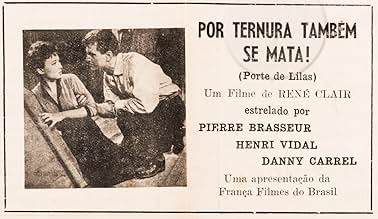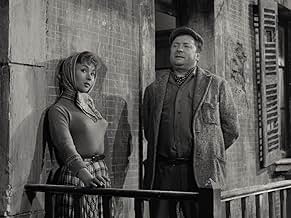IMDb-BEWERTUNG
7,1/10
807
IHRE BEWERTUNG
Füge eine Handlung in deiner Sprache hinzuAn old bum becomes infatuated with a pretty young girl who gets entangled with a young gangster.An old bum becomes infatuated with a pretty young girl who gets entangled with a young gangster.An old bum becomes infatuated with a pretty young girl who gets entangled with a young gangster.
- Regie
- Drehbuch
- Hauptbesetzung
- Für 1 Oscar nominiert
- 1 Gewinn & 5 Nominierungen insgesamt
Robert Balpo
- Un habitué du café
- (Nicht genannt)
Georges Bever
- Le pharmacien
- (Nicht genannt)
Teddy Bilis
- Un secrétaire au commissariat
- (Nicht genannt)
Charles Bouillaud
- L'agent
- (Nicht genannt)
Louis Bugette
- Le brigadier
- (Nicht genannt)
Gérard Buhr
- Un inspecteur
- (Nicht genannt)
Christian Denhez
- Un gosse
- (Nicht genannt)
Empfohlene Bewertungen
I saw Porte des Lilas, called The Gates of Paris in English, back in 1957 - fresh out of high school fascinated with foreign films, especially of the French and Italians. Maybe because I was an awkward and romantic teenager myself, I must have related to the awkward and romantic Juju, the oafish man in love with the beautiful girl, frustrated by her mis-directed love for the deceitful but charismatic hoodlum. Clair was a wonderful filmmaker, and I have always remembered this film vividly. It was Paris and romance and danger to me.
An escaped murderer (Henri Vidal) finds refuge in the cellar of a poor artist's house, where the artist and his derelict friend (George Brassens and Pierre Brasseur) help him out. The film is notable because of its cast - legendary singer Brassens in his only movie appearance, Vidal in a comeback film after one of his many rounds of rehab, and Brasseur in a lovable role that's both comedic and heartfelt. Dany Carrel is also strong as the smart young barmaid who uncovers the secret but then finds herself falling in love, and my goodness, she's stunning besides.
At its heart, and in a lighthearted way, the film examines the limits of selfish and selfless behavior. It's a little stagey in its story-telling and probably too light to be considered film noir, but the biggest issue is in character motivation - it just doesn't seem likely that the irascible character Vidal plays would get such help, and for so long. On the other hand, it's quite watchable, and it engages us early on, with Brassens singing a couple of songs while strumming his guitar, and Brasseur cleverly sneaking drinks from the local bar. He also steals ten cans of foie gras for his friend, and something about how he hurries around with them, then has to hide them from the police by tossing them out the window tickled me. He's a character whose laziness and mooching make him hard to like early on, but whose kindness and unrequited love make us feel for him as the film plays out.
Director René Clair tells the story well and gives us some nice shots, such as a scene of kids running around in the streets chasing and pretending to shoot at each other while Vidal's backstory is related. He also blends comedy, romance, and drama in a warm, entertaining tale.
At its heart, and in a lighthearted way, the film examines the limits of selfish and selfless behavior. It's a little stagey in its story-telling and probably too light to be considered film noir, but the biggest issue is in character motivation - it just doesn't seem likely that the irascible character Vidal plays would get such help, and for so long. On the other hand, it's quite watchable, and it engages us early on, with Brassens singing a couple of songs while strumming his guitar, and Brasseur cleverly sneaking drinks from the local bar. He also steals ten cans of foie gras for his friend, and something about how he hurries around with them, then has to hide them from the police by tossing them out the window tickled me. He's a character whose laziness and mooching make him hard to like early on, but whose kindness and unrequited love make us feel for him as the film plays out.
Director René Clair tells the story well and gives us some nice shots, such as a scene of kids running around in the streets chasing and pretending to shoot at each other while Vidal's backstory is related. He also blends comedy, romance, and drama in a warm, entertaining tale.
I've seen this movie in my teens, still going to school. Enjoyed it tremendously. For the romance, the atmosphere, but above all for the appearance of Georges Brassens with his songs. And all this happened in this end of nowhere neighborhood Port Des Lilas, of all places. It was then that I started buying French records and mostly Brassens, but also Ferre, Brel etc. That scene where they climb the garden wall, I can still see that happening for my inner eye. This movie gave me a similar impression and experience as movies like Le Notti di Cabiria and La Strada. I suppose my age had something to do with that, but I long to see it again.
I found this a pretty strange film at times. Rene Clair was a great stylist as anybody who has seen A nous la liberte, I Married a Witch, Les grandes manoeuvres and others knows. Here he has moved onto Marcel Carne's territory. I kept thinking of Le jour se leve, or Les portes de la nuit or L'air de Paris: somebody else's aesthetic and content.
Pierre Brasseur, who always projected a great confidence and sometimes a ferocious masculinity, here seems out of place as a timid man who drinks too much and has too few outlets for his energy. He really breaks loose in the dancehall scene when he picks up Dany Carrel and spins her around, daring anybody to stop him. Otherwise he goes glumly around the neighbourhood, bearing the brunt of children's insults (these kids are the most overactive in any French film).
Georges Brassens made no more films after this one; he shows little talent for acting but boy, can he sing. And you get a lot of his singing here. Raymond Bussieres and Carrel as father and daughter do very good work, Henri Vidal (who had a lot of muscles, as well as being Michele Morgan's husband) plays a homicidal creep well enough. Overall, a minor work by a great director whose best days were past him.
At the time of the movie's American release (as Gates of Paris), I had just discovered the songs of Georges Brassens, and I went to see it strictly because he was in it. The original novel was written by a close friend of his, and L'Artiste, the taciturn, solitary bard he plays, seems to have been based very much on Brassens himself. The film turned out to be a delightful, warmhearted work, holding up remarkably well on repeated viewings, and Brassens makes an excellent deadpan foil for the great Pierre Brasseur. And the songs he wrote for the film remain among the best of his classic repertoire. It's a hard movie to find these days, but I recommend it highly.
Wusstest du schon
- WissenswertesOfficial submission of France for the 'Best Foreign Language Film' category of the 30th Academy Awards in 1958.
Top-Auswahl
Melde dich zum Bewerten an und greife auf die Watchlist für personalisierte Empfehlungen zu.
Details
- Erscheinungsdatum
- Herkunftsländer
- Sprache
- Auch bekannt als
- The Gates of Paris
- Drehorte
- Produktionsfirmen
- Weitere beteiligte Unternehmen bei IMDbPro anzeigen
- Laufzeit
- 1 Std. 35 Min.(95 min)
- Farbe
- Seitenverhältnis
- 1.37 : 1
Zu dieser Seite beitragen
Bearbeitung vorschlagen oder fehlenden Inhalt hinzufügen




























